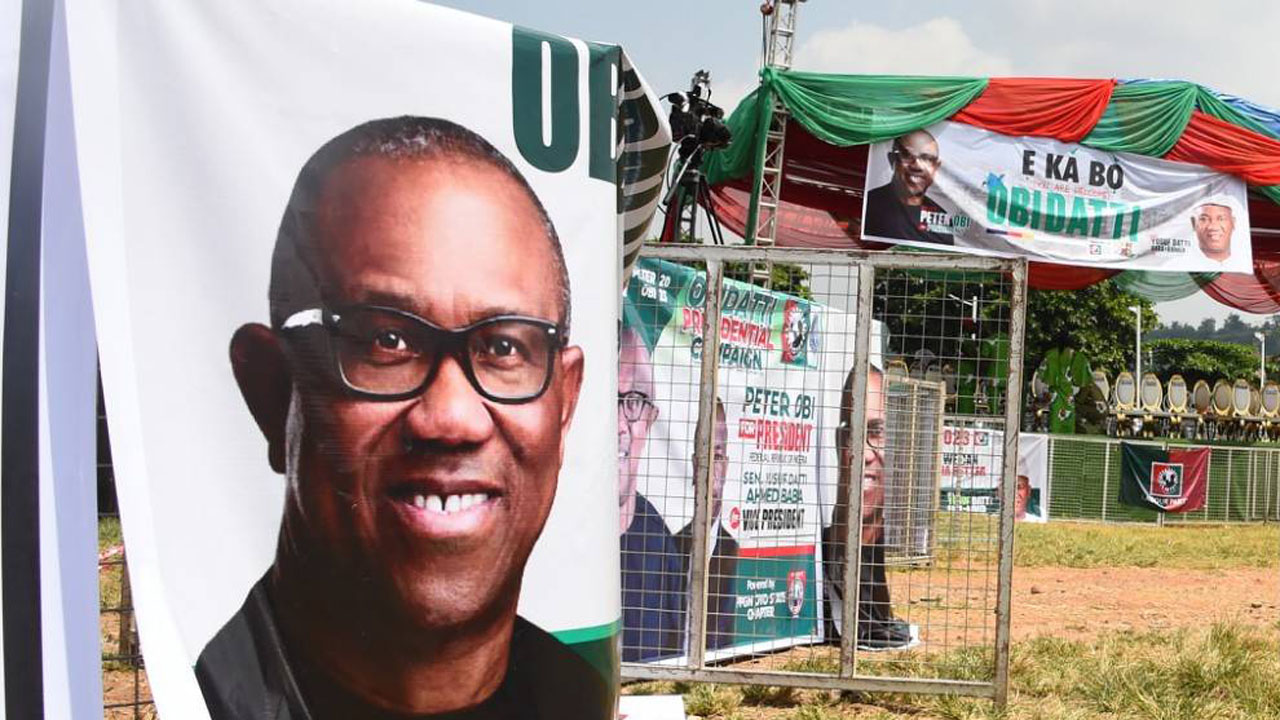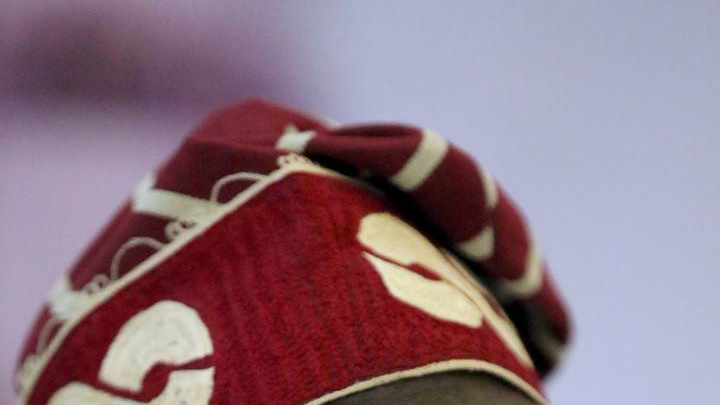
But, the presidential candidate of the Peoples Democratic Party (PDP) must be worried that these friends of his constitute a present danger to the attainment of his long-time ambition to be Nigeria’s President and Commander-in-Chief, especially after coming so close to the throne in 1999 to 2007.
Atiku’s chief challenger, Asiwaju Bola Ahmed Tinubu, has been his political ally from their days in the Social Democratic Party (SDP) through his first presidential run in 2007 on the platform of Action Congress of Nigeria (ACN). Further, both men were together again in the fold of the freshly minted All Progressives Congress (APC) from 2013 to 2017.
So, from former governors, Peter Obi, Rabiu Musa Kwankwaso and their outgoing Rivers State counterpart, Ezenwo Nyesom Wike, Atiku also had these three as close political allies and friends in the Peoples Democratic Party (PDP).

But, through unforeseen political schemes, these three friends have come to be at the frontline of the intriguing challenges dogging the former Vice President’s path to possible victory in the 2023 presidential poll.
Without a doubt, the 2023 general elections would be Atiku’s last opportunity to be on the ballot, unless there is a repeat of the ugly scenario that abridged Nigeria’s presidential democracy in 1983.
In the event of such an unexpected mischance and a Government of National Unity (GNU), which some patriots have broached, comes into play, it is to be expected that politicians of every hue would join forces to call for an early return to democracy.
Only through such deplorable intervention could the man from Adamawa aspire to be president again after 2023, because, by the 2027 election cycle, Waziri Adamawa would have become so electoral battle-weary and spent years contemplating further contest with nomination rigours to the booth.
Observers have noted that Atiku’s current campaigns to become Nigeria’s President do not showcase the same vitality and nationwide acceptability of his previous attempts, especially the 2018 outing. While some argue that the former Vice President’s 2018 effort ate deep into his finances, others place the blame on the wrangling over zoning of power within the main opposition PDP.
Unlike four years ago, Atiku’s presence on the presidential ballot has attracted mixed reactions rather than the previous near-unanimity and clamour as was seen in the buildup to the 2019 poll.
At the October 2018 Port Harcourt PDP special convention and presidential primary, Atiku’s emergence as winner elicited widespread acceptance from the party and among non-partisan stakeholders in the nation’s democracy project.
Then, former Kano State governor, Dr. Rabiu Musa Kwankwaso, who participated in that PDP primary, accepted the outcome. However, his supporters, particularly members of his Kwankwasiyya Group, had their reservations and clamoured for him to seek nomination on another platform.
For former Anambra State governor, Peter Gregory Obi, although he did not contest the PDP presidential ticket, he featured in the background as the potential presidential running mate. Despite his sterling performance in office as Anambra State chief executive, Obi’s selection as Atiku’s running mate stirred widespread antagonism among his kin from the Southeast geo-political zone.
All the same, in that hotly contested PDP presidential ticket, the outgoing Rivers State Governor, Wike, lined up behind his Sokoto State counterpart, Alhaji Aminu Waziri Tambuwal, to square up to Atiku. Nonetheless, Wike closed ranks immediately after the former Vice President emerged winner and became his ardent supporter.
So, it is clear that these four frontline political actors-Tinubu, Obi, Kwankwaso and Wike-could be adjudged as Atiku’s friends. But, with Tinubu at the blue corner, and Obi, Kwankwaso and Wike at the red corner, those friends have become Atiku’s deadly challengers in the 2023 presidential boxing ring.
The intriguing aspect of the unfolding electoral pugilism is that, instead of harnessing the full support of the PDP structure, Wike, who is not on the ballot, is investing his freedom from the contest to rally discontent within Atiku’s technical camp. And, with his Enye Ndi Ebaa politics, whereby he displays divided affinity among Tinubu, Obi and Kwankwaso, the Rivers State governor has made himself a ringside antagonist, thereby joining as Atiku’s dangerous friends in next year’s battle.
And so, to what extent and levels of danger would these ‘friendly fires’ challenge Atiku’s last fight on the mountain?
Tinubu: Arrow Of Hostility.
EVEN without saying it, the moment this former governor of Lagos State emerged as the candidate of the governing All Progressives Congress (APC), Atiku must have known that Asiwaju Bola Tinubu presents a major flank of hostility towards his presidential aspiration.
With its large volume of electors, Lagos State stands out among the states that donate large ballots during presidential contests. Add to the fact that he was a former governor of the state, Tinubu had, in the past 23 years, been oiling the machinery for his own presidential pursuit.
From being the last man standing in the Olusegun Obasanjo-inspired 2003 political cataclysm in the Southwest geopolitical zone, to securing the region as the bastion of opposition politics, Tinubu’s godfather status means that he is the man to beat in the zone next year. Therefore, it would come as one of the major upsets if Tinubu loses out in the contest for Southwest votes during the February 25, 2023 showdown.
Even at that, observations on trends and tendencies from the Southwest do not predicate that Atiku would be the man to deliver that magic uppercut if it ever occurs.
A political analyst, Dr Ahmed Adamu, is one of those that believe that Tinubu is not that invincible in the region anymore, even with the power of incumbency tucked in his box.
In a viral post, Adamu declared that President Muhammadu Buhari’s refusal to utter a word of endorsement during the kick-off of the APC Presidential campaigns in Jos, Plateau State, presents as eloquent testimony that the power of presidential incumbency would not be available for Tinubu.
“If a sitting president attends his party’s political rally and shies away from speaking is a clear message that he does not trust and believe in the candidature of the party’s candidate,” Adamu had stated.
Although some other observers blamed the President’s silence at the campaign podium on jet lag and travel fatigue after his two-week medical vacation in London, there were insinuations in APC also that Tinubu’s tactical withdrawal from Buhari’s declining popularity in the north, as well as debatable performance rating, led the President to sit on the fence of neutrality.
Then, Tinubu’s emi lokan (It’s my turn) declaration may have also elicited Buhari’s equivocal stance, just as his (Tinubu’s) attempt to transmute his emi lokan candidacy to a Southwest Awan lokan (its our turn) is being met with dissension in the region.
There had been subdued suggestions that the mainline Northern political actors in APC are set to sabotage Tinubu’s presidential run, especially against his decision to side-line Buhari’s Northwest zone and uptick same faith choice in a presidential running mate.
Some of those who hold such views claim that the north would work for Atiku’s electoral triumph on February 25 next year. Perhaps, that line of reasoning could have inspired Dr Adamu’s position, when he stated: “Since the emergence of Tinubu as the APC presidential candidate, President Buhari has not attended or endorsed the candidacy of Tinubu in any of the political rallies.
“It took the personal plead of APC chairman (Abdullahi Adamu) and Tinubu for Buhari to even appear at the APC rally for the first time… Things are becoming worse for Tinubu with his continued blunders in his political speeches. Tinubu is alleged to have avoided political rallies to prevent such embarrassment. For Tinubu to say God bless PDP instead of APC is a sign of a possible brain disorder called, Aphasia.”
Notwithstanding whatever political calculations may detract from Tinubu’s campaign to be Nigeria’s President, there is nothing to suggest that his hold on Southwest votes will shrink to an outright loss or that Atiku would harvest those missing ballots.
Obi: From Ball Boy To Playmaker
DURING the 2019 electioneering, the former Anambra State governor was Atiku’s presidential running mate. In the build-up to the 2023 general elections, opinions were divided, even as doubts swelled that Mr. Peter Obi would still play a second fiddle to Atiku on the PDP presidential ticket.
But, through a combination of factors, including the resolve by Southeast leaders that 2023 was ripe for their geopolitical zone to have a go at the Presidency, the Obi that was a boy decided to become a man and join the fray.
Though the fact remains moot, Obi’s candidacy on the Labour Party (LP) has helped to cast a shadow on Atiku’s participation in the presidential contest, especially given the power rotation dynamics of presidential politics. A chieftain of PDP, Chief Jonathan Sunday Akuns, told The Guardian that Atiku’s reaffirmation of his determination to restructure Nigeria loses its credibility due to the power rotation flavour in the country.
Akuns, who is the Galadima Bokos, Plateau State, maintained that the fixing of Nigeria’s rotation button has become urgent as a crucial step towards cementing the unity of the country in readiness for a progressive and stable future.
He noted that even though the former Vice President has continued to stress his promise to restructure the country if elected president in 2023, Nigerians believe that it was still necessary to look back at the 1906 Lugardian proclamation.
According to Akuns, “fixing ‘the rotation button’ is all about the much-vaunted advocacy for restructuring and power devolution in Nigeria. Such advocacy aims to immerse the Swiss governance framework in Nigeria in order to rejig the ‘initial conditions principles that founded the country from pristine territorial entities of a pre-colonial era of homeland statecraft.”
He contended that the 1914 fusion of the Northern and Southern protectorates into Nigeria as a single country marked the invention of ‘the rotation button’ by rousing constitutional governance framework for equity and inclusiveness of the six pristine territorial entities.
Speaking during the LP Presidential Campaign in Ibadan, the leader of Afenifere, the Yoruba Socio-political organisation, Pa Ayo Adebanjo, also stated that if there is any loan, it was that 2023 is the turn of the Southeast geopolitical zone to produce the next Nigeria’s President.
Kwankwaso: Kinship Rivalry
When he fought with Sokoto State governor and chairman of the PDP Governors’ Forum, Tambuwal, over the control of Northwest Zonal leadership, many watchers of PDP politics knew it was all about the party’s 2023 presidential ticket.
So, having seemingly done a cost versus benefit analysis of his continued stay and fight for relevance in PDP, this former Kano State governor moved with his famed Kwankwasiyya Group into a sleepy New Nigeria Peoples Party (NNPP).
Although that political migration was not credited with any great electoral consequence, it took the defection of Senator Ibrahim Shekarau, another former Kano governor and incumbent Senator representing Kano Central, for Kwankwaso to elicit serious national attention.
That consideration inflated when the former Defence Minister clinched NNPP’s presidential ticket and doubled down on his national acclaim by opening talks about a possible political alliance with Peter Obi’s LP.
Although the talks ended in misgiving, the planned alliance between the two former PDP stalwarts and Atiku’s friends showed to a large extent that the former Vice President has his challenges spread far and wide like his Pan-Nigeria stature.
Against the background of the foregoing, therefore, when the ballots for the 2023 presidential contest are counted and collated, it would be seen how far Atiku’s friends were able to help or hinder his last presidential contest.



